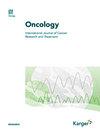Dose-reduction of bevacizumab in atezolizumab plus bevacizumab therapy extends treatment duration with disease control in patients with hepatocellular carcinoma.
IF 2.5
3区 医学
Q3 ONCOLOGY
引用次数: 0
Abstract
INTRODUCTION Atezolizumab (ATZ) and bevacizumab (BEV) combination therapy is widely used in patients with unresectable hepatocellular carcinoma (HCC). However, combination therapy is typically interrupted or discontinued owing to BEV-related adverse events. In this study, we examined the effects of BEV dose-reduction on the treatment of unresectable HCC using propensity score matching (PSM). METHOD Overall, 119 patients with HCC who were treated with ATZ + BEV between November 2020 and October 2022 were enrolled retrospectively at our institute. The therapeutic effects and safety of BEV dose-reduction and non-dose reduction after PSM were compared. Decision-tree analysis was used to investigate treatment duration in the patients. RESULTS Significant differences were not observed between the two groups after PSM. The objective response rate (ORR) and disease control rate (DCR) assessed by modified RECIST did not differ significantly between the two groups (BEV non-dose-reduction/dose-reduction: ORR; 46/34%, DCR; 80/91%). Progression-free survival (PFS) and overall survival (OS) also did not differ significantly between the two groups (BEV non-dose-reduction /dose-reduction: PFS; 5.6/8.6 months, OS; 18.6/15.5 months). The median duration of treatment in the BEV dose-reduction group was significantly longer than that in the non-dose-reduction group (BEV non-dose-reduction /dose-reduction: 4.8/9.1 months, P = 0.038). Decision-tree analysis revealed that dose-reduction of BEV was the first distinguishae factor for the extension of treatment duration with ATZ + BEV. CONCLUSION BEV dose-reduction can be effectively used in maintaining the treatment duration of ATZ + BEV while maintaining therapeutic effects and safety in real-world clinical practice.在阿特珠单抗加贝伐单抗疗法中减少贝伐单抗的剂量,可延长肝细胞癌患者的治疗时间并控制病情。
简介 阿特珠单抗(ATZ)和贝伐珠单抗(BEV)联合疗法被广泛应用于无法切除的肝细胞癌(HCC)患者。然而,联合疗法通常会因 BEV 相关不良反应而中断或中止。在这项研究中,我们采用倾向评分匹配(PSM)方法研究了BEV剂量减少对不可切除性HCC治疗的影响。方法在2020年11月至2022年10月期间,我院共回顾性纳入了119例接受ATZ+BEV治疗的HCC患者。比较了PSM后BEV减量和不减量的治疗效果和安全性。结果两组患者在 PSM 后未观察到显著差异。改良 RECIST 评估的客观反应率(ORR)和疾病控制率(DCR)在两组之间没有显著差异(BEV 非减量/减量:ORR:46/34%,DCR:80/91%)。无进展生存期(PFS)和总生存期(OS)在两组之间也无明显差异(BEV 无减量/减量:PFS:5.6/8.6/8.5):PFS:5.6/8.6 个月,OS:18.6/15.5 个月)。BEV减量组的中位治疗时间明显长于非减量组(BEV非减量/减量:4.8/9.1个月,P = 0.038)。决策树分析显示,BEV减量是延长ATZ+BEV治疗时间的首要区分因素。结论在实际临床实践中,BEV减量可有效维持ATZ+BEV的治疗时间,同时保持治疗效果和安全性。
本文章由计算机程序翻译,如有差异,请以英文原文为准。
求助全文
约1分钟内获得全文
求助全文
来源期刊

Oncology
医学-肿瘤学
CiteScore
6.00
自引率
2.90%
发文量
76
审稿时长
6-12 weeks
期刊介绍:
Although laboratory and clinical cancer research need to be closely linked, observations at the basic level often remain removed from medical applications. This journal works to accelerate the translation of experimental results into the clinic, and back again into the laboratory for further investigation. The fundamental purpose of this effort is to advance clinically-relevant knowledge of cancer, and improve the outcome of prevention, diagnosis and treatment of malignant disease. The journal publishes significant clinical studies from cancer programs around the world, along with important translational laboratory findings, mini-reviews (invited and submitted) and in-depth discussions of evolving and controversial topics in the oncology arena. A unique feature of the journal is a new section which focuses on rapid peer-review and subsequent publication of short reports of phase 1 and phase 2 clinical cancer trials, with a goal of insuring that high-quality clinical cancer research quickly enters the public domain, regardless of the trial’s ultimate conclusions regarding efficacy or toxicity.
 求助内容:
求助内容: 应助结果提醒方式:
应助结果提醒方式:


